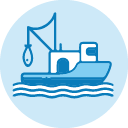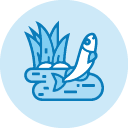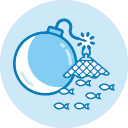
IMPROVED PRODUCTION OF TIGER SHRIMP (Penaeus monodon) THROUGH PROBIOTICS APPLICATION
The study was carried out in Brebes District, the North coast of Java. Tiger shrimp farming in Indonesia, particularly in this area faced some problems which caused by improper pond preparation, disease, and low seed quality. Probiotic was applied in pond to solve this problem. The aim of this study was to evaluate the production of tiger shrimp in ponds with probiotic applications. Six experimental ponds (each measuring 0.5 ha) were selected of which three were probiotic ponds and three were controlled. Tiger shrimp postlarvae (PL-30) were stocked at density of four shrimps/m2. Tiger shrimps were reared for three months. Shrimps were fed by commercial pellet. In the first month, shrimp were fed about 7%-5% of the total biomass; in the second months, 3.5%-3% of the total biomass; and in the third month, 2.5%-2% of the total biomass. The treatments in this study were the application of probiotics with concentration of 3 mg/L that were given every five days and control (without probiotics). The results showed the rearing period was 92 ± 6 days in probiotic ponds and 76 ± 16 days in controlled pond. The shrimp in controlled pond should be harvest earlier caused by the high mortality. The average final weight was 16.2 ± 0.7 g in probiotic pond and 15.6 ± 1.9 g in controlled pond. The survival rate was 64.13 ± 12.63% in probiotic pond and 44.17 ± 14.15% in controlled pond. Production was 208 ± 46 kg/pond/cycle in probiotic pond and 123 ± 6 kg/pon /cycle in controlled pond. The result showed that probiotic plays an important role in maintaining water quality parameters and health management as well as increases the survival of shrimp.
Availability
| B1707368 | Koleksi Digital | Archivelago Indonesia Marine Library - Perpustakaan Kementerian Kelautan dan Perikanan | Available |
Detail Information
- Series Title
-
-
- Call Number
-
Koleksi Digital
- Publisher
- Jakarta : Indonesian Aquaculture Journal., 2015
- Collation
-
-
- Language
-
English
- ISBN/ISSN
-
-
- Classification
-
NONE
- Content Type
-
-
- Media Type
-
-
- Carrier Type
-
-
- Edition
-
-
- Subject(s)
- Specific Detail Info
-
-
- Statement of Responsibility
-
-
Other version/related
No other version available
File Attachment
Comments
You must be logged in to post a comment
 Perikanan Tangkap
Perikanan Tangkap  Perikanan Budidaya
Perikanan Budidaya  Pengolahan Ikan
Pengolahan Ikan  Pulau Kecil
Pulau Kecil  Masyarakat Pesisir
Masyarakat Pesisir  Local Content
Local Content  Ekspor Perikanan
Ekspor Perikanan  Illegal Fishing
Illegal Fishing  Ilmu - Ilmu Sosial
Ilmu - Ilmu Sosial  Geografi dan Sejarah
Geografi dan Sejarah